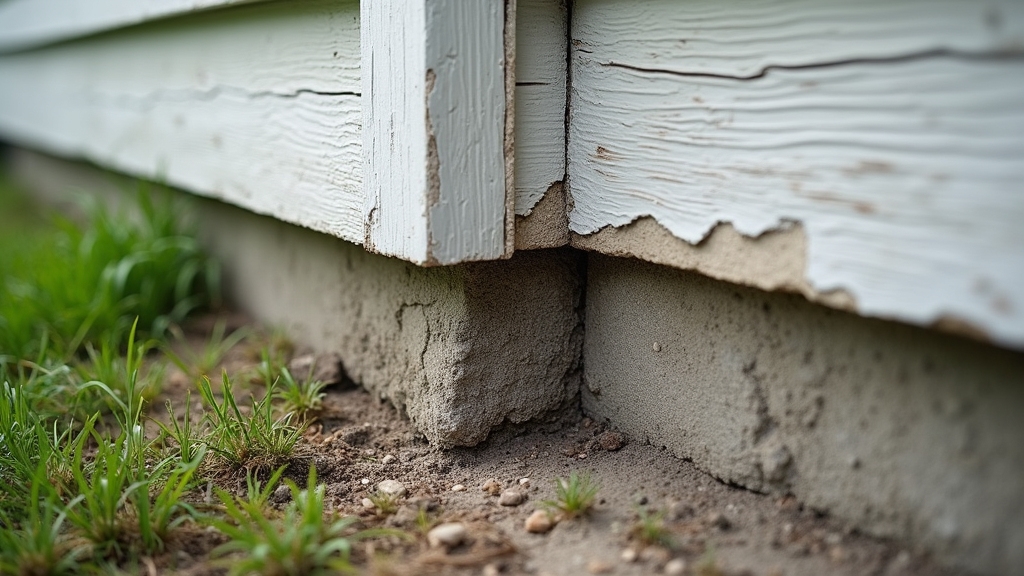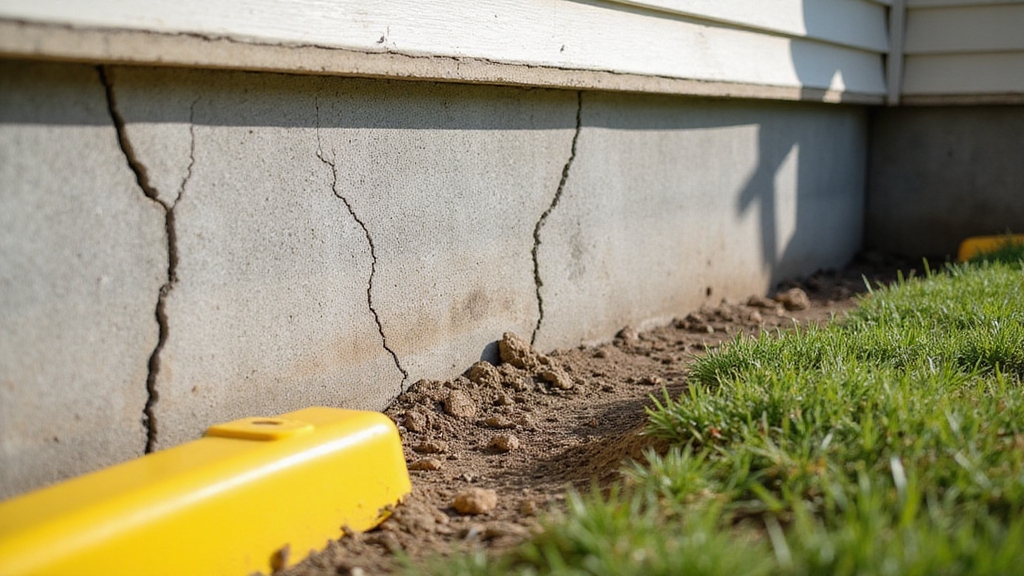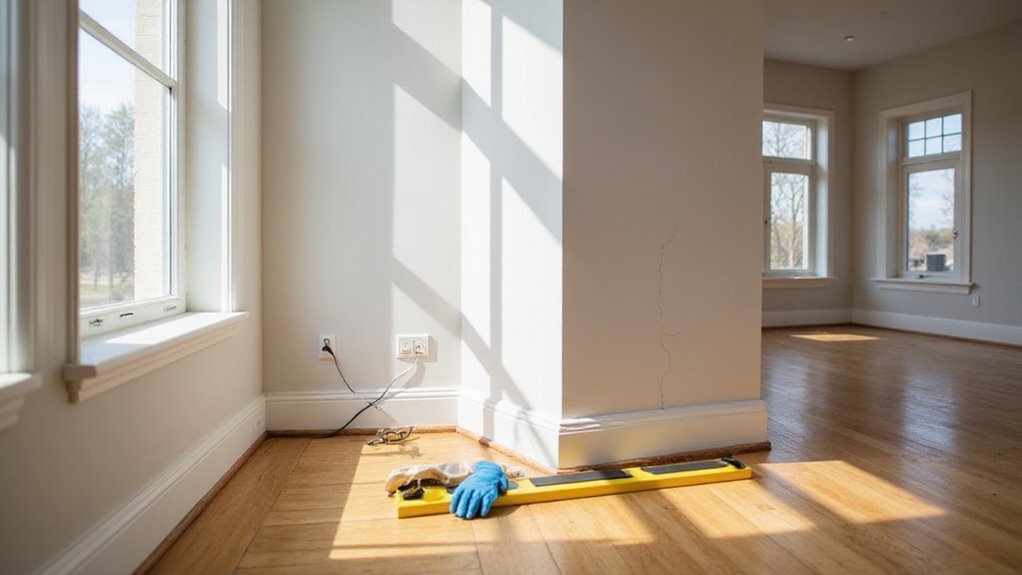Selling a house with foundation problems can be tough. Most buyers hesitate or back out when they hear about structural issues. This can lead to fewer offers and lower sale prices.
Foundation concerns make your home harder to market. Many lenders will not approve mortgages for homes with major structural problems. You may also face longer selling times and more negotiations about repairs.
You should repair foundation issues before selling if you want the best price and smoother transactions. However, there are situations where selling as-is may make more sense.
We will help you decide which option is right for your situation. This blog will guide you through your choices and show how to handle foundation problems before selling your home.
Key Takeaways
- Repairing foundation issues before selling increases your home’s value and marketability, often leading to higher offers and a faster sale.
- Unfixed foundation problems can reduce your home’s value by 10–20% and deter many potential buyers.
- Most buyers hesitate or demand significant discounts if foundation problems are not addressed prior to listing.
- Providing documentation of completed repairs builds buyer trust and helps avoid legal or financing complications.
- Comparing repair costs to potential sale price reductions can help determine if fixing the foundation is financially worthwhile.
Understanding Foundation Issues and Their Causes

Foundation issues can lower your home’s value and make selling harder. These problems often happen because the ground under your house is unstable. Common signs include cracks in walls or floors and doors that do not close right. A comprehensive property evaluation can help identify underlying issues before they affect your sale.
Additionally, understanding the soil stability of your property can guide effective repairs and prevent future problems. Soil instability is a main cause of foundation settlement. Expansive clay, loose fill, or changes in moisture can make the soil shift. Even small changes in moisture can move the ground over time. If you know about these risks early, you can fix them before selling. Proactive checks can save you money and stress. This also helps you avoid last-minute problems with buyers.
Signs Your Home May Have Foundation Problems
You can spot foundation problems in your home by checking for certain warning signs. Cracks in the basement, especially if they are horizontal or wider than a quarter inch, are concerning. If you see these, your foundation might be settling. Addressing foundation issues early can prevent more extensive and costly repairs down the line. Additionally, legal options for disputes such as filing a partition action or seeking court-appointed oversight can be necessary if owners cannot agree on repairs or sale.
Doors or windows that stick or will not close properly can indicate an issue. Uneven or sloping floors also suggest movement under your house. Cracks above doors or windows are another common sign. About 25% of U.S. homes experience some foundation problems, according to experts. Gaps between walls and ceilings or separation at exterior walls should not be ignored. If you notice any of these signs, you should get a professional inspection.
How Foundation Issues Affect Property Value

Foundation issues can lower your home’s value. Buyers often pay much less for houses with these problems. If the foundation is not fixed, you may have trouble selling for your desired price. Cash buyers can often close deals faster, even on homes with foundation issues, due to their ability to bypass traditional financing hurdles. Banks may not approve loans for homes with visible foundation damage.
This can reduce the number of people who can buy your property. Real estate agents also say these homes stay on the market longer. If your house shows signs of foundation movement, appraisers may lower its value. Buyers may ask for price cuts or repairs. You could end up accepting offers below what you hoped for.
The Home Inspection Process and Foundation Concerns
When you list your home, inspectors look for clear foundation red flags like cracks, uneven floors, and sticking doors. They use specialized tools and proven methods to assess the extent of any issues, which can directly influence buyer confidence and offers. Addressing these concerns upfront helps you avoid costly surprises and negotiation setbacks. Additionally, understanding the home inspection process can help you prepare for potential findings and streamline the sale.
Common Foundation Red Flags
A home’s foundation is one of the most important parts checked during an inspection. If you notice foundation problems, they could lead to bigger issues. Knowing the common warning signs can help you act early.
Cracks in walls, doors that stick, and sloping floors often mean there are problems with the foundation. These signs can point to trouble with the soil or the materials under your house. If you ignore these signs, small problems may turn into expensive repairs.
Here is a table of common foundation red flags and what they might mean:
| Red Flag | What It May Indicate |
|---|---|
| Horizontal wall cracks | Pressure from unstable soil |
| Uneven floors | Shifting foundation materials |
| Gaps around windows/doors | Foundation movement or settling |
| Sticking doors/windows | Foundation shifting |
| Water in basement/crawl | Poor soil stability, drainage |
If you spot these signs early, you can keep your selling process on track. Taking care of foundation issues quickly can save money and time. Buyers will also feel more confident about your property.
Inspector Evaluation Methods
Home inspectors follow a step-by-step process to find foundation problems. They look for uneven floors, cracked walls, and doors that do not close properly. If these signs are present, inspectors use special tools to measure the damage.
Laser levels help check if your floors are level. Moisture meters can show if there is too much water in the foundation. If inspectors find water issues, they will also look at how water drains around your home.
Inspectors compare levels in different rooms to spot foundation settling. They check the soil around your house, since moving soil can cause more damage. If your home is on problem soil, you may need repairs before selling.
Impact on Buyer Decisions
Foundation issues have a strong impact on buyer decisions. Most buyers see these problems as serious risks. Inspection results can easily influence a buyer’s choice to continue or back out.
If an inspector finds foundation settlement, buyers may worry about repair costs. The National Association of Realtors says 60% of buyers walk away or ask for price cuts when structural concerns are found. Even small cracks or shifts can make buyers uneasy.
Sellers who fix these issues before listing often build more trust with buyers. Addressing concerns early can also make negotiations smoother. If you are transparent and proactive, more buyers are likely to feel confident about your home.
Buyer Perceptions of Houses With Foundation Problems
When buyers spot foundation issues, their trust in your home’s overall condition drops sharply—72% say they’d hesitate to move forward without repairs. Most will offer significantly less, with typical price reductions ranging from 10% to 15%. If you want to avoid lowball offers and skepticism, address foundation problems before listing. Conducting a title search to clarify ownership and uncover any existing liens or disputes can also help reassure buyers that the property is a sound investment.
Impact on Buyer Trust
Foundation issues can quickly reduce buyer trust. Visible problems may cause buyers to worry about hidden damage or future repairs. If buyers see these signs, they may hesitate to make an offer.
Many buyers avoid homes with structural concerns. The National Association of Realtors reports that over 60% of buyers hesitate with these issues. Buyers may believe the home was not well maintained.
If you fix foundation problems before selling, buyers see you as responsible and honest. Addressing repairs shows you care about the property’s condition. This makes buyers feel more confident about purchasing your home.
Influence on Offer Price
Foundation problems usually make buyers offer less for your home. Most buyers notice cracks or uneven floors and worry about extra repair costs. If the issues are not fixed, you may get lower offers or wait longer to sell.
Homes with foundation issues can lose 10% to 20% of their market value. The exact loss depends on how bad the damage is and local demand. Some buyers may ask for even bigger discounts due to risk.
Sellers should compare the cost of repairs to the expected drop in price. Fixing the foundation before selling can help you get better offers. If you are unsure, consult a real estate expert before listing your home.
Cost Analysis of Repairing Foundation Damage
Foundation repairs can be expensive and may affect your home sale. Repair costs range from $2,000 for small cracks to over $15,000 for serious issues. If you plan to sell, knowing these costs can help you decide what to fix.
Waterproofing the foundation usually costs between $2,000 and $7,000, depending on your home’s size and needs. Structural reinforcement may require steel piers, which cost $1,000 to $3,000 per pier. You should also expect to pay $500 to $2,000 for permits or engineering checks.
If you get several quotes, you can compare prices and repair options. Proper documentation and accurate cost basis records can also help minimize tax liabilities if you sell shortly after repairs. Prioritize the most urgent repairs to save money or time. This approach can help you meet your financial and selling goals. Additionally, considering quick cash offers from investment companies can streamline your sale process if you prefer to sell as-is and avoid costly repairs.
Weighing the Benefits of Repairing Before Listing
When you address foundation issues before listing, you signal to buyers that your property is well maintained, which can significantly boost their confidence. Data shows that repaired foundations often translate to higher sale prices and fewer negotiations. By investing in repairs now, you position your home more competitively in the market.
Boosting Buyer Confidence
Addressing foundation issues before selling your home makes buyers feel more confident. It shows your property is safe and well cared for. Buyers notice when repairs are done in advance.
Most buyers do research and get thorough inspections. If you provide repair records, it shows you are honest about your home’s condition. Buyers trust homes with clear documentation.
Homes with repaired foundations usually sell faster and attract more offers. If you fix problems early, fewer deals fall through during negotiations. Taking care of repairs can make the selling process much smoother.
Increasing Market Value
Repairing foundation issues can increase your home’s market value. Buyers prefer homes with solid, documented repairs. If you fix foundation problems before selling, your property becomes more attractive.
Industry data shows professionally repaired homes may sell for 10% more. Appraisers often give higher values to homes with completed repairs. If repairs are finished, you can justify a higher asking price.
When you present proof of repairs, buyers have less room to negotiate. The investment in foundation work often pays off at sale. If you want a stronger market value, proactive repairs are a smart choice.
Risks of Selling a Home With Unrepaired Foundation Issues

Selling a home with unrepaired foundation issues creates serious risks. These problems warn buyers about possible deep structural damage. If you list without fixing them, you face financial losses and legal issues. Proper disclosure and transparency are essential to avoid future legal complications. Unfixed foundation damage lowers your home’s value. Buyers usually offer less to cover the cost of repairs. Some lenders might not approve loans for homes with foundation issues. If inspectors find problems, sales may fail or take longer to close. Fewer buyers will be interested, which limits competition.
Homes with foundation issues often sell for 10-15% less than repaired homes. Addressing foundation repairs before selling can protect your finances. It helps keep your home’s value higher and makes it easier to attract buyers. Fixing issues early also gives you stronger power during negotiations, especially if there are liens or encumbrances on the property.
Disclosure Requirements for Foundation Defects
When selling a home, you must tell buyers about any known foundation defects. Most states require you to share this information. You should be honest about any structural problems. Legal disclosure requirements also emphasize the importance of transparency, especially regarding significant issues like foundation defects. Disclosure forms in almost every state ask if you know about foundation issues.
If you do not disclose them, you could face legal problems or lose the sale. Buyers may ask for inspections or lower the price if defects are found. Always keep records of repairs and receipts. These documents help prove what work was done. Honest disclosure builds trust and protects you from future problems. Being aware of disclosure laws can help you navigate your legal obligations effectively.
Impact on Mortgage Approval and Financing
Foundation problems can make it hard to get a mortgage. Lenders see these issues as unsafe and risky. If the foundation is not fixed, most banks will deny the loan or require repairs first. Proper documentation of repairs can also influence the approval process and help demonstrate the property’s safety. Industry reports show that over 60% of underwriters notice foundation problems.
These issues can cause delays, loan denials, or force you to make repairs. If you repair the foundation before selling, more buyers can qualify for a mortgage. Addressing timing considerations early in the process can prevent potential setbacks. Skipping repairs may lead to longer negotiations and lower offers. Buyers may also face slower closings. Fixing the foundation makes the sale process smoother for both sides.
Attracting Cash Buyers Versus Traditional Buyers
Homes with foundation issues usually attract more cash buyers than traditional buyers. Traditional buyers need a mortgage, but lenders want a stable foundation before approving loans. Cash buyers can purchase homes without these lender requirements.
If you want to sell as-is, share any structural assessments you have. Be honest about any foundation repairs still needed. This helps cash buyers feel confident and lets them act faster.
Knowing your buyers helps you set clear expectations. If you focus on cash buyers, you can often sell faster. Being prepared for this shift makes the process smoother.
Negotiating With Buyers Over Foundation Repairs
Foundation problems often worry buyers and can lead to requests for repairs or lower prices. Sellers should have a clear plan to handle these concerns. Addressing buyer worries quickly can help keep the sale moving.
Sellers should give buyers copies of inspection reports and repair estimates. These documents show you are being open about the issue and its cost. A price reduction or credit at closing is another good option. This credit should match the real cost of needed repairs.
If buyers ask for repairs, decide together which ones are truly necessary. Optional repairs can be discussed, but the main focus should be on safety and stability.
If several buyers are interested, sellers can use this to negotiate better terms. More interest can mean fewer concessions are needed.
Working With Real Estate Agents on Homes With Structural Problems
Selling a home with structural problems requires a skilled real estate agent. The right agent can guide you through the process and help avoid common mistakes. They can manage disclosures, pricing, and negotiations to make the sale smoother.
An agent with experience in foundation issues will know current market values. If you want to set the right price, you should include estimated repair costs. Accurate pricing can help attract serious buyers and reduce delays.
You must disclose all known structural problems to avoid legal trouble. If you provide engineering reports, you can build trust with buyers. Buyers are more likely to proceed if they see repair documentation.
Agents often have contacts with reliable contractors and inspectors. If quick repairs are needed, their network can help speed up the process. Well-marketed homes with structural improvements tend to sell faster.
Alternatives to Full Foundation Repair Before Selling
You do not always need a full foundation repair before selling your home. Several alternatives can address foundation concerns and still attract buyers. These options can help you save time and money.
If you cannot complete repairs, you can disclose the problem and offer buyers a credit for repairs after the sale. Partial repairs may also help by fixing the most urgent areas and showing you care for the home. Routine maintenance, like improving drainage or moisture control, can prevent further damage.
Structural reinforcement, such as steel piers or wall anchors, can stabilize the foundation without a full repair. Each choice depends on your budget and how quickly you want to sell. You should pick the option that best fits your situation.
Conclusion
If you repair foundation issues before selling, you can increase your home’s value and attract more buyers. Taking care of these problems can prevent delays and tough negotiations during the sale. Addressing foundation repairs can help your transaction go smoothly.
If you choose not to make repairs, you may face a lower sale price and fewer interested buyers. Some buyers prefer homes without major concerns. If you want to avoid repairs, you still have options.
At Limitless Homes of KC, we buy houses for cash, even if they need foundation repairs. If you want to sell quickly and easily, contact us today. We can help you move forward without the stress of costly repairs.

